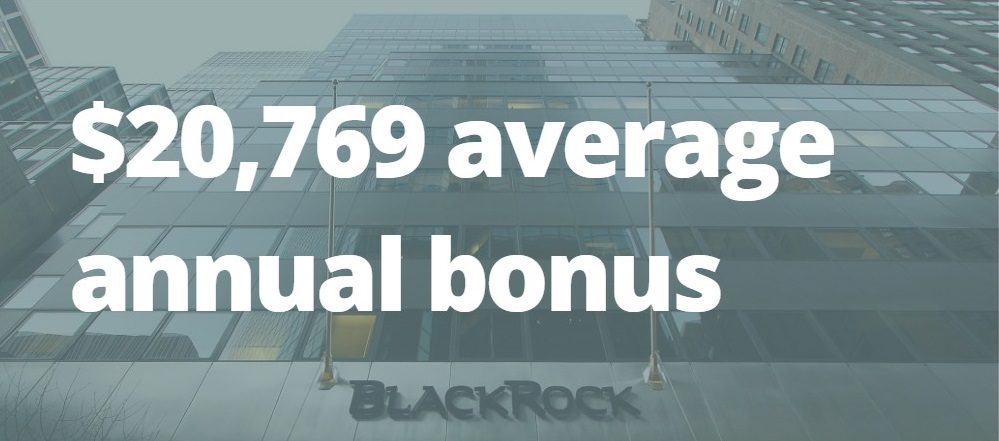MBA Job Opportunities: BlackRock

Though many MBA grads are passionate about their career prospects, those driven to work in the financial industry may be more reticent to commit to a life of uncomfortable suits and harsh fluorescent lights. A TINYpulse study found that employees at financial service companies have some of the lowest career satisfaction rates out there, despite stable salaries. The study put the amount of financial service employees who are happy with their work environment at less than 22 percent. In fact, an eFinancialCareers study found that one third of bankers hate their jobs. So, does an MBA and a penchant for finance mean a life of tolerating punishing work hours with little recognition from colleagues and superiors? Not necessarily.
Recent MBA grads with a penchant for finance will be pleased to learn that BlackRock, Inc., one of the largest asset-management companies in the world, provides a different kind of environment from the majority of financial institutions. Business Insider consistently ranks BlackRock as one of the premier financial employers in the U.S, writing, “The firm is big on employee development plans and employee engagement. For example, employees get to pitch ideas to senior executives at the two-day Innovation Summit, which helps spur new products for retirees and connect coworkers across different departments, according to LinkedIn.”
Why Work at BlackRock?
In a Business Insider interview, Jeff Smith, Senior Managing Director at BackRock’s Head of Global Human Resources Group, called BlackRock, “… an incredibly passionate place with a very clear sense of purpose that comes from Larry Fink, our founder and CEO, to everyone else in the company.”
BlackRock is renowned for its relaxed corporate culture, and 73 percent of its employees report high job satisfaction. The company employs over 130 investment teams in 30 different countries, so there is ample opportunity to join BlackRock beyond its New York City headquarters.
BlackRock’s effort to create a successful and diverse environment has been nothing short of empowering. Since 2015, over 2000 of the company’s prominent employers joined in the “Driving Better Decisions” initiative, which aims to help remove “unconscious bias” in decision-making, according to the official BlackRock website, as well as rethink the way human resources recruits and develops diverse talent. While the gender ratio at the company is still predominantly male, BlackRock has also made a concerted effort to increase female employment in senior management roles to 30 percent by the end of the decade, signing the HM Treasury’s Women in Finance Charter.
Pay Day
According to recent PayScale survey figures, MBA grads, despite their role, earn around $86,000 annually at BlackRock. These figures fluctuate depending on the specific role, rising to as much as $316,000 per year for investment strategists. According to the same data, bonuses at the company are also pretty exceptional. Portfolio managers reported an average bonus of $39,000 per year, while even the lowest bonus figures neared $10,000 per year.

Figures according to PayScale data.
Interning at BlackRock
For students nearing the end of their higher education journey, BlackRock offers summer internships for a glimpse of life at the company. BlackRock’s global Analyst Program is a two year-long entry level program for new graduates. The program kicks off with a training in New York City. Throughout the program, trainees will develop their skills in communicating with clients and understanding how to help them manage fiduciary matters.
BlackRock offers several other internships, and is conscious of promoting diversity in their industry. The Founders Scholarship provides merit rewards and a summer internship to students who identify as Black, Hispanic, Native American, LGBTQ, or disabled. Merit awards for this scholarship can be as high as $15,000.
Getting Hired
In an interview with eFinancialCareers, Jonathan Jones, director of global campus recruiting at BlackRock, gave some insight into how interested candidates can get their foot in the door at the company.
“What I think makes a BlackRock person stand out though, is that we look for people who embody or represent our principles. For example, we have a commitment to innovation. Innovation—original thinking, problem solving, and creativity – is central to our identity. Equally, we have a strong commitment to teamwork, and we look for people who can join the dots between our disparate activities in ways which can solve problems for our clients,” Jones said.
According to Jones, BlackRock hires many recent university graduates with Bachelor’s degrees, and the company also hires MBA candidates who have work experience that is relevant to specific positions, such as real estate and equity research.
A recent highlight from Clear Admit on the best business school’s for MBA grads that want to break into the industry that these five schools produced the most finance employees:
- Columbia Business School
- University of Chicago Booth School of Business
- New York University Stern School of Business
- University of Pennsylvania’s Wharton School
- Cornell Johnson Graduate School of Management
BlackRock has been actively recruiting at the world’s high ranking universities, stopping by Columbia Business School as recently as last month for an information session. Read here to find out for more events the company is hosting in the coming weeks and months and check out more about a potential career with BlackRock below.
MIT Sloan Startup LaborX Bridging the Tech Job Divide

There’s a widening rift between employers that need high-end tech employees and a stagnant workforce. Dominican-born, Bronx-raised MIT Sloan MBA ’14 grad Yscaira Jimenez’s soon-to-be-launched LaborX can help wedge the divide.
A Recommendation Revolution Is Underway in MBA Admissions: What You Need to Know

I’m busy, you’re busy, your boss is most definitely busy. Indeed, publications ranging from Men’s Health to the Atlantic, the Washington Post to Forbes are all reporting that “busyness“ has become the new status symbol for our times. Which is part of what makes asking someone to write you a letter of recommendation for business school so daunting. Now, try telling that person that you actually need five different letters for five different schools. Oy vey.
As uncomfortable a spot as it puts applicants in—it’s no better for recommenders. Even your most vociferous supporter is going to wonder what in the world she’s gotten herself into when she realizes that helping you in your pursuit of acceptance to business school means taking time away from work or play or family or whatever else to labor over leadership assessment grids, each a little different from the one before, and write 10 slightly different answers to 10 slightly different questions. Here’s hoping that your top-choice school doesn’t happen to be the last one she gets around to…
Good news. The graduate management education industry recognizes the strain that letters of recommendation put on applicants and recommenders alike and has been wrestling with ways to make the process easier for everyone involved. To this end, the Graduate Management Admission Council (GMAC) established a committee made up of admissions representatives from dozens of leading business schools to brainstorm about ways to lessen the burden while still collecting the third-party assessments of candidates that are so critical to the MBA application process.
GMAC Pilots Common MBA Letter of Recommendation
As an outgrowth of that committee’s work, GMAC last year piloted a common MBA letter of recommendation (LOR) that schools can choose to incorporate into their applications to reduce the burden placed on applicants and recommenders alike.
“The Common Letter of Recommendation (LOR) effort is intended to save you and recommenders valuable time by providing a single set of recommendation questions for each participating school,” reads the GMAC website. “This allows your recommenders to use the same answers for multiple letter submissions, alleviating the workload of having to answer different questions for each school multiple times. You benefit because it makes the ask for several different letters to be written on your behalf much easier.”
Cornell’s Johnson Graduate School of Management, NYU Stern School of Business, and Michigan’s Ross School of Business were among the first schools to pilot the Common LOR last year. In addition to a single set of open-ended essay questions, the pilot Common LOR also included a leadership assessment grid inviting recommenders to rate applicants on 16 “competencies and character traits” grouped into four main categories of achievement, influence, personal qualities and academic ability.
“At Johnson, we saw the Common LoR as a clear opportunity to improve the admissions process for candidates and their recommenders in a way that would also add value to our own assessment of applicants,” Judi Byers, Johnson executive director of admissions & financial aid, told Clear Admit. “A thorough and consistent review is important to us and the grid provides a straightforward base of insights that can be assessed and compared reliably while the accompanying letter adds meaningful detail and context,” she added.
Soojin Kwon, managing director of full-time MBA admissions and program at Ross, sees applicants and recommenders as the main beneficiaries of the Common LOR and is pleased that more schools are coming on board. “As more schools adopt it, applicants won’t have to feel like they’re burdening their recommender with completing multiple rec letters with different questions and ratings grids,” she told Clear Admit. “This year, more than a dozen of the top 20 schools are using it.”
Ross was also among the schools to first pilot the Common LOR last year, and Kwon served as part of the GMAC committee that helped craft it.
Common Questions Easy to Agree on, Common Leadership Grid Not
“What we found in using the Common LOR this year past year was that the questions gave us helpful insights into applicants, particularly on the important area of constructive feedback. The questions, however, were fairly similar to what we and other schools were using before, so it was easy for the AdCom to use it,” she notes.
Those questions are as follow:
- Please provide a brief description of your interaction with the applicant and, if applicable, the applicant’s role in your organization. (50 words)
- How does the performance of the applicant compare to that of other well-qualified individuals in similar roles? (E.g. what are the applicant’s principal strengths?) (500 words)
- Describe the most important piece of constructive feedback you have given the applicant. Please detail the circumstances and the applicant’s response. (500 words)
- Is there anything else we should know? (Optional)
“The rating grid was quite different from what we’d used in the past,” Kwon continued. “It was also the most difficult part for the GMAC advisory group to develop and get agreement upon. The group worked this past year to revise and simplify the grid so that AdComs could get more meaningful insights from it.”
This year, the 16 competencies and character traits from the original grid have been distilled to 12, with specific questions about analytical thinking and information seeking omitted. Johnson and Ross have both incorporated the revised leadership grid into the LOR distributed to applicants as part of their applications, as have most other schools that have this year decided to incorporate both the grid and open-ended essay question portions of the form. UT’s McCombs School of Business and Rice University’s Jones Graduate School of Business, notably, still seem to feature the earlier version of the leadership grid in their application, the one that calls on recommenders to assesses applicants on 16 competencies and traits.
Building a Career after Graduation: Columbia Business School

Huzzah! You made it through the b-school ringer! Now ready for the fun part? Finding a job!
Do Women Entrepreneurs Get Less VC Funding? Wharton and Columbia Researchers Find a Large Gender Gap

Over the last few years, there has been a lot of talk about more women in business. From the promotion of organizations like the Forté Foundation—which seeks to enhance women in business—to CNBC claiming “the Golden Age for women entrepreneurs has finally begun,” enterprising women seem to be everywhere. Unfortunately, this doesn’t mean that the deck is stacked in their favor. In fact, researchers from Columbia Business School and The Wharton School found the opposite was true.
The Gender Gap in Startup Funding
In a paper published in the Academy of Management Journal titled, “We Ask Men to Win & Women Not to Lose: Closing the Gender Gap in Startup Funding,” researchers looked at how women fared compared to men when they were trying to get funding for their startups.
After reviewing footage from the TechCrunch Disrupt startup competition, the researchers found that women were asked entirely different types of questions about their companies compared to their male counterparts. Men received more questions about their project’s potential for growth, while women received questions on the opposite end, about their potential risks and losses. This difference in questioning had a measurable impact on the funding each startup received.
The research paper, written by Dana Kanze (a Columbia Business School Ph.D. student), Laura Huang (a Wharton School Professor), Mark A. Conley (a Columbia Psychology Ph.D.), and E. Tory Higgins (a Columbia Psychology Professor), sought to delve into the enormous gender gap revealed in venture capital funding. According to the paper, only 2 percent of VC funding goes to women entrepreneurs in spite of the fact that women own 38 percent of U.S. businesses and represent 7 percent of venture capital firms.
One of the keys to this drastic difference in funding was how VCs—both male and female—framed funding questions for women-created businesses. Kanze explained the thought process in a Forbes article.
“According to the psychological theory of regulatory focus, investors adopted what’s called a promotion orientation when quizzing male entrepreneurs, which means they focused on hopes, achievements, advancement, and ideals,” Kanze said. “Conversely, when questioning female entrepreneurs, they embraced a prevention orientation, which is concerned with safety, responsibility, security, and vigilance.”
Inside the Research
To study how this difference in questioning impacted women and men entrepreneurs, the research team reviewed the Q&A sessions of 189 startup entrepreneurs—12 percent of whom were women—held by 140 prominent venture capitalists—40 percent of whom were women. Using software to analyze each session, researchers discovered that 67 percent of questions posted to men were promotion-oriented while 66 percent of questions posted to women were prevention-oriented.
In the end, the study found that this difference in questioning led to a huge difference in VC funding. Among comparable companies, the research team found that businesses that were asked prevention-oriented questions raised (on average) $2.3 million in funds in 2017, while their promotion-focused counterparts raised $16.8 million—nearly seven times more.
“In fact, for every additional prevention question asked of an entrepreneur, the startup raised a staggering $3.8 million less, on average,” Kanze told Forbes. She continued, saying, “Controlling for factors that may influence funding outcomes—like measures of startups’ capital needs, quality, and age, as well as entrepreneurs’ past experience—we discovered that the prevalence of prevention questions completely explained the relationship between entrepreneur gender and startup funding.”
However, there was some good news. For female entrepreneurs who received prevention-focused questions but responded with promotion-type answers, they were able to raise $7.9 million, versus $563,000. This suggests that regardless of how VCs phrase their questions, entrepreneurs can recover much of their funding potential if they answer in the positive.
To test their findings, the research team conducted an experiment that recreated the TechCrunch Disrupt conditions with 194 VCs—30 percent of whom were women—and 106 entrepreneurs—47 percent of whom were women. After removing startup specific details, the team asked the VCs to allocate $400,000 to their chosen entrepreneur.
According to the Kanze in a Harvard Business Review article, the team found that: “Angel investors allocated an average of $81,113 to startups in the prevention question, promotion answer condition—1.6 times larger than the $52,369 average allocated to those in the prevention question, prevention answer condition. Similarly, ordinary investors gave an average of $96,321 to the prevention question, promotion answer condition—1.7 times larger than the $55,377 average given to the prevention question, prevention answer condition.”
Speaking with Professor Laura Huang
To gain additional insight into the results of the research paper, we spoke with Professor Laura Huang at the Wharton School. Here’s what she has to say.
- What was the most surprising result that came out of your study?
“It was surprising that both men and women investors were equally as likely to ask prevention-focused questions to women, as opposed to promotion-focused. It wasn’t that men were the only ones biased, but that both genders were equally as likely to be biased.”
- Do you have any advice for female entrepreneurs looking to raise venture capital?
“Stop it in its tracks. When you see something like this happening, stop it immediately and redirect the response so that you’re making yourself on equal footing. Don’t allow that train of thought to go through where you’re getting asked prevention-focused questions and investors are focused on the risk. Answer the question that’s asked but redirect your response toward possibilities and success.”
- How do you think VC funding can change for the future to close the gender gap?
“Part of it is an awareness on the investors’ side. It’s also up to the entrepreneurs to redirect each question toward the right focus. A lot of this gap is implicit. Investors don’t realize they’re asking prevention-focused questions of women; they just automatically ask certain questions to each gender. Awareness around the tendency toward prevention-focused questions for women entrepreneurs and a focus on redirection toward promotion is key.”
Top MBA Recruiters: Finding A Role With PepsiCo

PepsiCo is one of the most well-known companies in the world. Known as a top manufacturer, marketer, and distributor of soft drinks and snack foods, the company also serves as a top recruiter of MBA talent in the United States. Continue reading…
